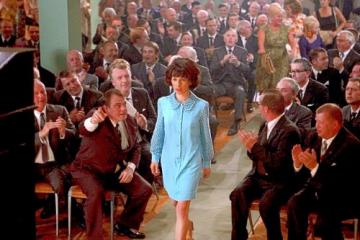'Made in Dagenham' retells women's fight for equal pay
In 1968, Ford Motor Co.'s Dagenham factories outside London comprised seven square miles and churned out an astonishing 3,000 vehicles a day. We -- and "Made in Dagenham" -- are focused on a machinists division in which the seat covers and door-panel upholstery are hand-cut on individual sewing machines by 187 women, many stripped to their underwear due to stifling work conditions.
At the outset, union rep Albert (Bob Hoskins) shields his eyes, in deference more to his own modesty than theirs, as he summons "the girls" for a heavy confab about their employment status. They've always been paid much less than men, of course. But recently -- with the approval of the union's own top leadership and of Harold Wilson's Labour government -- Ford has classified them as "unskilled" workers, in order to legitimize and formalize the inequity.
Perhaps, says Albert, it's time to rebel. He's seeking a second woman, in addition to the shop steward, for a grievance meeting with management. Quiet Rita O'Grady (Sally Hawkins) is drafted. Local union chief Monty (Kenneth Cran ham) instructs them to just shut up and nod during the session, but Rita can't. In a spontaneous outburst, she lays down demands for redress -- or a strike. Ford, calling her bluff, opts for the latter.
But it's not a bluff.
True stories like this have been filmed before, most famously in Martin Ritt's "Norma Rae" (1979), with Sally Field as a poor Southern textile worker radicalized into action. Director Nigel Cole is an adept and credentialed handler of the British version. His "Saving Grace" (2000) starred Brenda Blethyn as an unwacky widow who goes into the marijuana business. His "Calendar Girls" (2003), with Helen Mirren and Julie Walters, concerned middle-aged ladies posing in the nude. Mr. Cole and his screenwriter, William Ivory, are nothing if not acutely sensitive to women's economic issues.
So was Barbara Castle, Harold Wilson's Employment Secretary, played here by Miranda Richardson. She delightfully chews up the Westminster scenery as she comes to the realization that it's not really about skill levels but gender exploitation.
Meanwhile, back at the melodramatic ranch, Rita's house-hubby Eddie (very agreeably played by Daniel Mays) copes as well as he can, down to his last clean shirt, taking the kids to school, burning the toast -- all the familiar family-fallout issues from having an activist mom. In an excellent confrontation scene, Eddie reminds her what a good husband he's been -- not drinking, gambling, womanizing or hitting her or the kids. Her forceful response is shocking: "You're a saint now? Oh, lucky me! For Crissakes, all that's as it should be!" She's working for rights, not privileges.
Soon enough, the Dagenham factory runs out of seats, production lines grind to a halt, and the male workers, too, are laid off. Castle spars with puffing, patronizing Prime Minister Wilson. Ford yanks his chain, threatening to move its facilities, and the stakes for corporate financial and local social order are hiked.
If you don't know or can't guess how things turn out, I won't spoil it for you. Suffice to say, the struggle is hardly over today, and many gains have been lost. American manufacturers have since largely finessed the problem by outsourcing plants and jobs to Third World countries lacking any unions or equal-pay statutes. Just eight weeks ago, a GOP filibuster in the U.S. Senate killed the Paycheck Fairness Act, which would have added enforceable teeth to existing U.S. laws.
But the surprising thing about "Made in Dagenham" is how entertaining -- not how political -- it is, thanks to director Cole's choice of Sally Hawkins for his lead. As in Mike Leigh's "Happy Go Lucky" (2009), she approaches and infuses her role with a marvelously light touch. It's a subtle, endearing enactment of a predictable predicament: the evolution from docile housewife to fiery leader.
If Ms. Hawkins gets an award for this, her acceptance speech would not likely include, "You like me! You really like me!"






